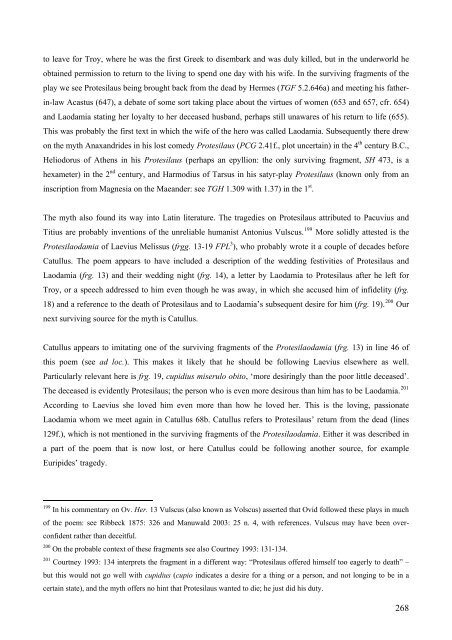CATULLUS 68 - Scuola Normale Superiore
CATULLUS 68 - Scuola Normale Superiore
CATULLUS 68 - Scuola Normale Superiore
Create successful ePaper yourself
Turn your PDF publications into a flip-book with our unique Google optimized e-Paper software.
to leave for Troy, where he was the first Greek to disembark and was duly killed, but in the underworld he<br />
obtained permission to return to the living to spend one day with his wife. In the surviving fragments of the<br />
play we see Protesilaus being brought back from the dead by Hermes (TGF 5.2.646a) and meeting his father-<br />
in-law Acastus (647), a debate of some sort taking place about the virtues of women (653 and 657, cfr. 654)<br />
and Laodamia stating her loyalty to her deceased husband, perhaps still unawares of his return to life (655).<br />
This was probably the first text in which the wife of the hero was called Laodamia. Subsequently there drew<br />
on the myth Anaxandrides in his lost comedy Protesilaus (PCG 2.41f., plot uncertain) in the 4 th century B.C.,<br />
Heliodorus of Athens in his Protesilaus (perhaps an epyllion: the only surviving fragment, SH 473, is a<br />
hexameter) in the 2 nd century, and Harmodius of Tarsus in his satyr-play Protesilaus (known only from an<br />
inscription from Magnesia on the Maeander: see TGH 1.309 with 1.37) in the 1 st .<br />
The myth also found its way into Latin literature. The tragedies on Protesilaus attributed to Pacuvius and<br />
Titius are probably inventions of the unreliable humanist Antonius Vulscus. 199 More solidly attested is the<br />
Protesilaodamia of Laevius Melissus (frgg. 13-19 FPL 3 ), who probably wrote it a couple of decades before<br />
Catullus. The poem appears to have included a description of the wedding festivities of Protesilaus and<br />
Laodamia (frg. 13) and their wedding night (frg. 14), a letter by Laodamia to Protesilaus after he left for<br />
Troy, or a speech addressed to him even though he was away, in which she accused him of infidelity (frg.<br />
18) and a reference to the death of Protesilaus and to Laodamia’s subsequent desire for him (frg. 19). 200 Our<br />
next surviving source for the myth is Catullus.<br />
Catullus appears to imitating one of the surviving fragments of the Protesilaodamia (frg. 13) in line 46 of<br />
this poem (see ad loc.). This makes it likely that he should be following Laevius elsewhere as well.<br />
Particularly relevant here is frg. 19, cupidius miserulo obito, ‘more desiringly than the poor little deceased’.<br />
The deceased is evidently Protesilaus; the person who is even more desirous than him has to be Laodamia. 201<br />
According to Laevius she loved him even more than how he loved her. This is the loving, passionate<br />
Laodamia whom we meet again in Catullus <strong>68</strong>b. Catullus refers to Protesilaus’ return from the dead (lines<br />
129f.), which is not mentioned in the surviving fragments of the Protesilaodamia. Either it was described in<br />
a part of the poem that is now lost, or here Catullus could be following another source, for example<br />
Euripides’ tragedy.<br />
199<br />
In his commentary on Ov. Her. 13 Vulscus (also known as Volscus) asserted that Ovid followed these plays in much<br />
of the poem: see Ribbeck 1875: 326 and Manuwald 2003: 25 n. 4, with references. Vulscus may have been overconfident<br />
rather than deceitful.<br />
200<br />
On the probable context of these fragments see also Courtney 1993: 131-134.<br />
201<br />
Courtney 1993: 134 interprets the fragment in a different way: “Protesilaus offered himself too eagerly to death” –<br />
but this would not go well with cupidius (cupio indicates a desire for a thing or a person, and not longing to be in a<br />
certain state), and the myth offers no hint that Protesilaus wanted to die; he just did his duty.<br />
2<strong>68</strong>






